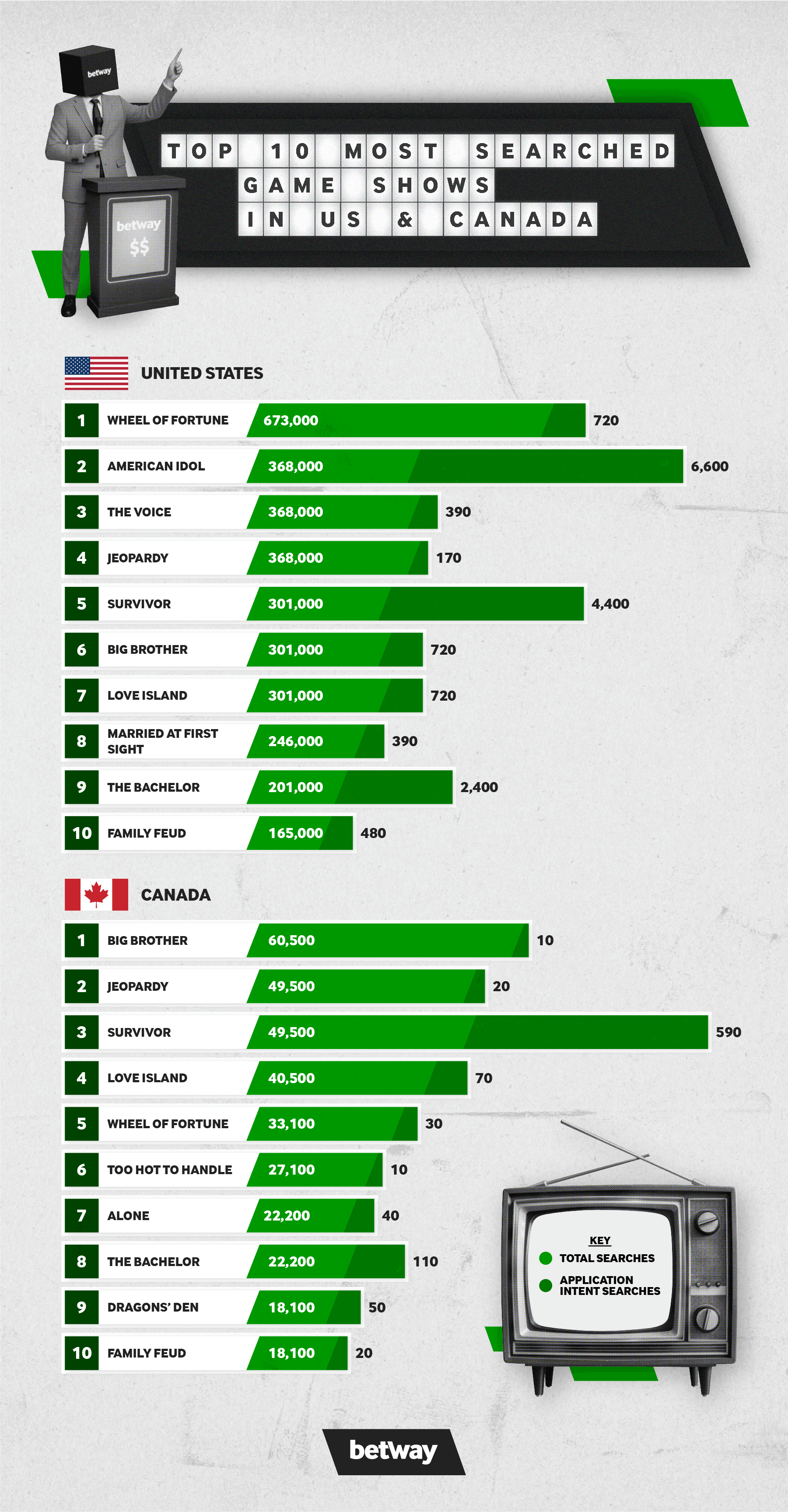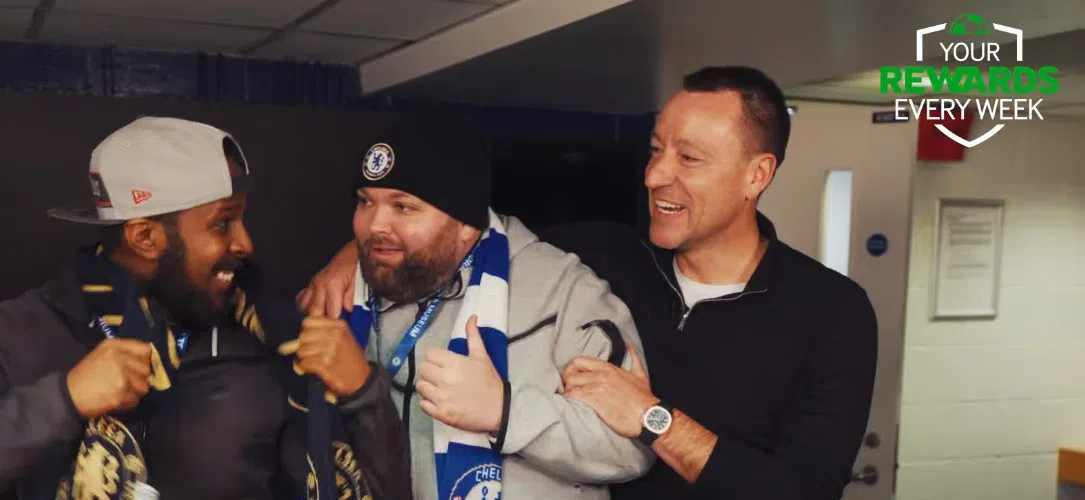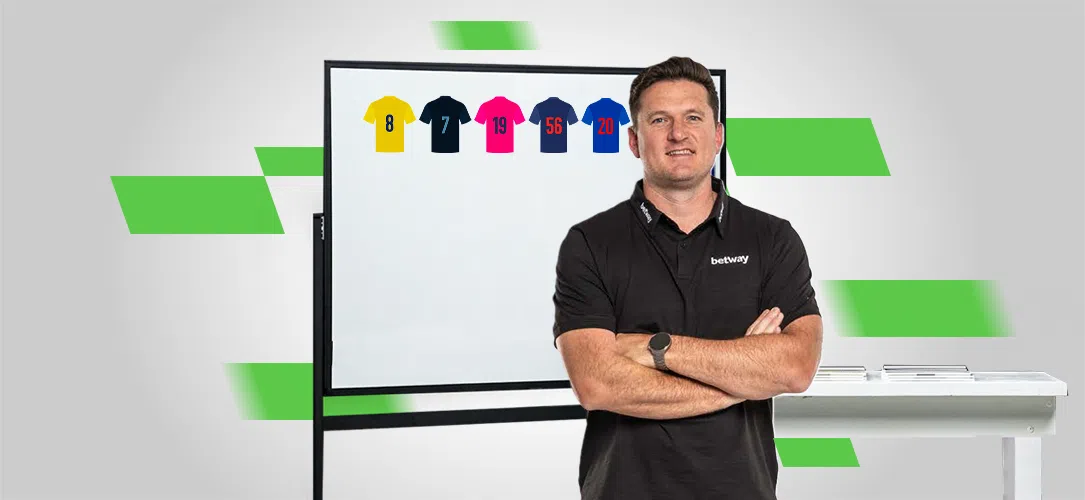From Big Brother to The Traitors, Jeopardy! and more; discover the most popular game shows across North America, and which ones you're most likely to win.
Game on, North America! The shows we binge, dream of joining, and are most likely to win
From solving puzzles for cash, to surviving the wild, and winning love on TV, game shows and reality competitions continue to capture our imaginations across the U.S. and Canada.
But which shows are we obsessed with, which ones are we desperate to join, and which could we actually win?
We’ve crunched the data – including Google search volumes, application intent, city-by-city trends, and win-ability scores – to give you the full picture.
With so many shows out there, we wanted to answer a few key questions:
Which TV game and reality shows are North Americans most obsessed with?
Where are people most likely to actually apply to be contestants?
And if you’re aiming to succeed, which shows provide the best opportunity?
We dove deep into Google search data from the past three years, tracking national and regional trends across the U.S. and Canada.
We also analysed which shows people are actively applying to; and finally, we scored each show on how “winnable” it is, based on its structure, format, and difficulty level.
America’s most popular game and reality shows
In the U.S., the game show obsession runs deep, and the numbers prove it.
Wheel of Fortune leads the way with 673,000 searches and 720 expressions of interest.
American Idol comes second and, perhaps unsurprisingly, has the most application intent searches with 6,600 people considering testing their singing ability on TV.
Jeopardy! is third on the list with 368,000 generic searches, and another 170 searches in relation to applying.
These are the top 10 shows Americans are searching for and applying to in massive numbers:
Top 10 shows Americans want to compete in:
Show | Total searches | Application intent searches |
American Idol | 368000 | 6600 |
Survivor | 301000 | 4400 |
The Bachelor | 201000 | 2400 |
The Amazing Race | 49500 | 1300 |
Dragons’ Den | 18100 | 1000 |
Wheel of Fortune | 673000 | 720 |
Big Brother | 301000 | 720 |
Love island | 301000 | 720 |
Family Feud | 165000 | 480 |
The Voice | 368000 | 390 |
Canada’s game show craze: What the north is watching
Canada has its own flavour of reality TV fandom, and the search and application numbers reveal some unique preferences.
Big Brother is the country’s most searched game show, with 60,500 people browsing the search term.
Survivor, however, sees the most application intent, with 590 searches exploring the possibility of entering the show.
Top 10 shows Canadians want to compete in:
Show | Total searches | Application intent |
Survivor | 590 | 49500 |
The Bachelor | 110 | 22200 |
Love Island | 70 | 40500 |
Dragons’ Den | 50 | 18100 |
The Traitors | 50 | 9900 |
Alone | 40 | 22200 |
The Amazing Race | 40 | 6600 |
Wheel of Fortune | 30 | 33100 |
Jeopardy | 20 | 49500 |
Family Feud | 20 | 18100 |
Toronto is the keenest of the Canadian locations when it comes to game shows, with Dragons’ Den, Survivor, and Love Island most appealing to the Ontario city.
Vancouver has a nearly identical taste in game shows, with Dragons’ Den and Survivor the most popular, and Too Hot to Handle pipping the similar Love Island to third spot.
Interestingly, Calgary expressed little interest in Dragons’ Den, with more residents instead applying for Big Brother.

Which Shows Are Most Achievable?
To assess how realistic it is to succeed on these shows, we reviewed their formats: the skill level required, solo vs. team-based structure, number of contestants, and the nature of eliminations.
Some shows demand specific knowledge or endurance, while others are more straightforward, giving everyday participants a more accessible path to success.
Here’s how shows stack up in terms of win-ability from hardest to easiest:
Most Winnable U.S. game shows
Show | Win-ability score |
Let’s Make a Deal | 6 |
Cash Cab | 7 |
Weakest Link | 8 |
Jeopardy! | 10 |
Wheel of Fortune | 10 |
Most Winnable Canadian Game Shows
Show | Win-ability score |
Cash Cab | 6 |
Are You Smarter Than a Canadian 5th Grader? | 6 |
The Traitors | 8 |
Family Feud | 15 |
Big Brother | 22 |
From trivia classics and survival challenges to finding love under the sun, game shows and reality TV continue to inspire and entertain millions across North America.
Whether you’re just binge-watching at home or gearing up for your audition tape, there’s no denying our collective fascination with these shows. And, no matter your motivation – fame, fortune, or fun – the next big win could be yours.
Looking for more excitement? Explore our selection of casino games for a fun and engaging experience. Or dive into our casino blogs, where we share everything from Blackjack strategy tips to insights on what it takes to succeed on shows like Big Brother.
Experience the thrill of our casino wherever you are. Get it today from the Play Store or the App Store and dive into a world of exciting games, big wins, and exclusive bonuses.
Methodology
Methodology:
Data Sources
Search Volume Data:
Google Search Volume: Collected using Google’s Keyword Planner Data was aggregated over the past 12 months to reflect current interest levels.
Search volumes were obtained for:
Each show name (e.g., “Survivor”, “The Voice”).
Each country: USA and Canada.
Regional detail: U.S. states and major Canadian cities
Application Intent Search Volume:
Collected for terms indicative of a user’s intent to participate or apply to the show.
Keywords included:
“Apply to [show name]”
“Casting [show name]”
“How to get on [show name]”
“[Show name] auditions”
Search volumes were sourced in the same manner and over the same time period as total search volume data.
3. The methodology for scoring the game shows that is easier to win is based on several factors.
Each factor is assigned a grade according to its difficulty.
Luck Factor:
Grade 1: Easier games (more luck)
Grade 2: More knowledge required (difficult)
Grade 3: Combines knowledge and luck or requires physical effort (most difficult)
Team or Single:
Grade 1: Team-based games
Grade 2: Single-player games
Elimination Rounds:
Grade 2: Games with elimination rounds (more difficult)
Grade 1: No elimination rounds
Carry-On:
Grade 2: Games where contestants can continue to further rounds
Grade 1: No carry-on opportunities
Number of Contestants:
1 contestant = Grade 1
2 contestants = Grade 2
3 contestants = Grade 3
4 contestants = Grade 4
5 contestants = Grade 5
6 contestants = Grade 6
10 contestants = Grade 7
15 contestants = Grade 8
20 contestants = Grade 9
28 contestants = Grade 10
Scoring System:
The easier the game, the fewer points it gets.
The harder the game, the more points it gets based on the factors above.






















